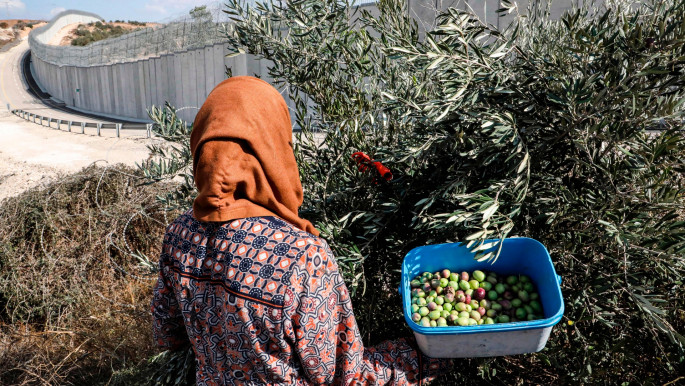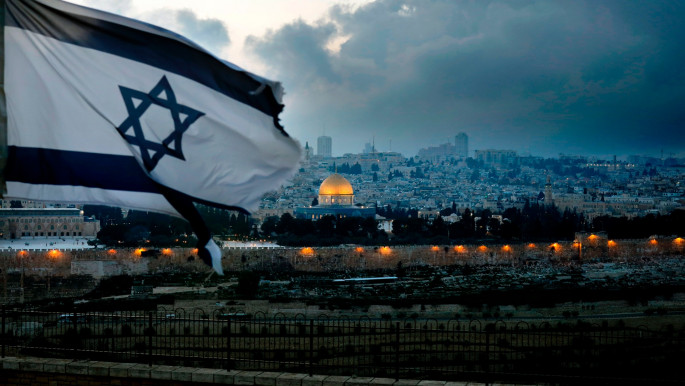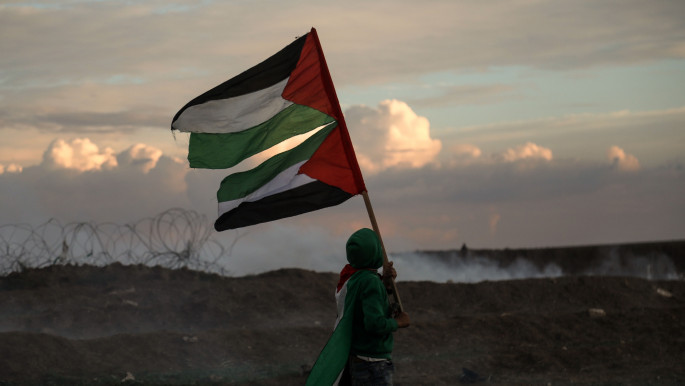'Decorating the cage': How UAE plans to modernise Israeli checkpoints could entrench the occupation
The head of the US International Development Finance Corporation (DFC), Adam Boehler, announced on 20 October that the US, Israel and the UAE would set up a minimum $3 billion investment fund - to be called the Abraham Fund - in private investment to strengthen regional economic resiliency and peace in the Middle East and North Africa.
Speaking at a ceremony to mark the arrival of the first official UAE delegation in Israel, the DFC's executive said that part of the funds will be used to "modernise" Israeli-operated checkpoints for Palestinians in the West Bank.
"Economic security=Economic prosperity. Abraham Fund will prioritise investments to promote stability, peace and security in the West Bank and beyond, starting with the optimization +modernization of the West Bank crossing," the CEO tweeted.
A trilateral development office will be opened in Jerusalem "to identify and initiate strategic projects with a high developmental impact, including those that catalyse economic growth, improve standards of living, and create high-value, quality jobs", a joint statement read.
 |
You cannot decorate someone's cage and claim you're improving their quality of life. Palestinians are still imprisoned and you're reinforcing this fact |  |
UAE Minister of State Ahmed Ali Al Sayegh stated that his country "is confident the initiative can be a source of economic and technological strength for the region, while simultaneously improving the lives of those who need the most support".
"We've already made progress…to change and modernize the checkpoints for Palestinians throughout all of Israel and Jordan," Boehler said in announcing the trilateral plan.
 |
|
| Read more: Palestine's olive harvest marred by rising Israeli settler violence |
Ilan Goldenberg, Middle East Security Director at the Center for a New American Security (CNAS), slammed the proposed policy. "Israel should do everything it can to ease freedom of movement for Palestinians. That is its responsibility as an occupying power. But it's crazy and terrible policy for the UAE and the US to be funding 'checkpoint upgrades'", he said in a tweet.
The announced initiative came more than a month after Abu Dhabi and Tel Aviv signed a US-sponsored deal to normalise ties, which the Palestinian people viewed as a betrayal of their cause.
"Palestinians will feel more disappointed when they see an Arab country contributing to developing the mechanisms and tools to restrict their movement, separate them from each other, and impede their daily life," Anas Aljerjawi, MENA regional manager at Euro-Mediterranean Human Rights Monitor, told the The New Arab.
He also expressed concern that the UAE, from being a consistent supporter of the UN agency for Palestinian refugees (UNRWA), may decide to cut its financial support, or make such aid conditional as a political tool.
Omar H. Rahman, an analyst in Middle East and American foreign policy, believes there is a risk that any country that normalises relations with Israel could get drawn into supporting and keeping the oppression of Palestinians in place, especially if they are going to invest in Israel's security industry.
 |
There are more than 700 Israeli checkpoints across the West Bank which hamper the free movement of Palestinian people and goods |  |
The political analyst observed that if the joint fund goes towards upgrading the Israeli checkpoint infrastructure, it will clearly signal that Israel has no intention of leaving the occupied territories.
"Checkpoints are designed to fragment the contiguity of the Palestinian territory and obstruct Palestinian life and livelihoods. Any upgrade to that will continue to achieve this very objective," he highlighted, speaking to The New Arab.
The declared pledge to promote regional peace and ameliorate the lives of people in the region through the Abraham Fund is evidently at odds with updating Israel's military checkpoints, one of its top priorities.
Most of the movement restrictions in the occupied West Bank - permanent checkpoints, roadblocks, gates, closed roads, barriers, and the separation wall - are put in place to specifically restrict Palestinian access to roads used by Israeli settlers or to areas near or controlled by settlements.
 |
|
| Read more: The day after annexation: Israel, Palestine and the one-state reality |
Security checkpoints often exist specifically for the benefit of Israeli settlements, which are illegal under international law, while they divide the West Bank into segregated cantons splitting Palestinian communities and limiting Palestinian freedom of movement.
Currently, there are more than 700 Israeli checkpoints across the West Bank that hamper free movement of Palestinian people and goods, despite Israeli claims that they serve security purposes.
Only in September of this year, Euro-Mediterranean Human Rights Monitor documented that Israel set up an additional 300 flying checkpoints throughout the Palestinian territory.
The rights group recently cited a 2020 UNCTAD report which found that Israeli checkpoints alone cost the West Bank's economy at least 6 percent of Palestinian GDP. The report also concluded that erecting one checkpoint one minute away from a district reduces the probability of being employed by 0.41 percent, the hourly pay by 6.3 percent and working days by 2.6 percent.
 |
Checkpoints are designed to fragment the contiguity of Palestinian territory and obstruct Palestinian life and livelihoods |  |
Palestinians lose about 60 million working hours per year due to Israeli checkpoints and restrictions on movement, according to a study by the Applied Research Institute (ARIJ). This loss is estimated at $270 million per year, as well as the extra fuel consumption of 80 million litres per year at a cost of $135 million.
Improving or upgrading these checkpoints by no means can lead to improving the lives of Palestinians, nor to fostering peace.
"You cannot decorate someone's cage and claim you're improving their quality of life. They [Palestinians] are still imprisoned and you're reinforcing this fact," Maha Hussaini, executive manager of Impact International for Human Rights Policies, told The New Arab. She considered Abu Dhabi's move a clear recognition of its willingness to strengthen its means to restrict Palestinians' basic rights.
 |
|
| Read more: How the Israel-UAE alliance formalises new fault lines in the Middle East |
Just a day after the Abraham Fund was publicised, Euro-Med Monitor issued a statement saying that the group was "alarmed" by the Israeli-Emirati plans to set up a fund that would enable "modernizing" Israeli checkpoints in the Palestinian territories.
"The UAE government should refrain from and immediately halt any deals with Israel that may contribute to or embolden human rights violations against Palestinians," the Geneva-based rights organisation appealed.
It warned that financing the "modernisation" of the Israeli checkpoints would play a significant role in covering up their destructive impact on Palestinians, while making the Israeli occupation permanent.
Aljerjawi anticipated that updating checkpoint facilities and devices will equip Israel with a more sophisticated security system that will, in turn, further control and restrict Palestinian lives.
"Any investment in developing these oppressive, restrictive systems will contribute to perpetuating Israel's occupation," the MENA manager maintained.
Instead of joining a project to modernise checkpoints, Palestinians would have expected the UAE to pressure Israel to dismantle them. Yet, the Emiratis have not shown any intention in using their diplomatic ties with Tel Aviv for the purpose of protecting Palestinian rights.
In Rahman's view, investing in checkpoint upgrades would be strategically risky for the UAE since "taking part in or being directly involved in the machinery of Israel's subjugation of Palestinians" will be badly perceived at home and in the Arab public.
Hussaini, who is also a board member of Euro-Med Monitor, cautioned that upgrading checkpoints would give "legitimacy to the occupation", and reinforce restrictions on Palestinian freedom of movement between their cities and neighbourhoods.
She argued that the Gulf state is not only giving Israel a green light to continue to violate international law, but is also "financing and sponsoring its human rights violations".
Alessandra Bajec is a freelance journalist currently based in Tunis.
Follow her on Twitter: @AlessandraBajec





 Follow the Middle East's top stories in English at The New Arab on Google News
Follow the Middle East's top stories in English at The New Arab on Google News


